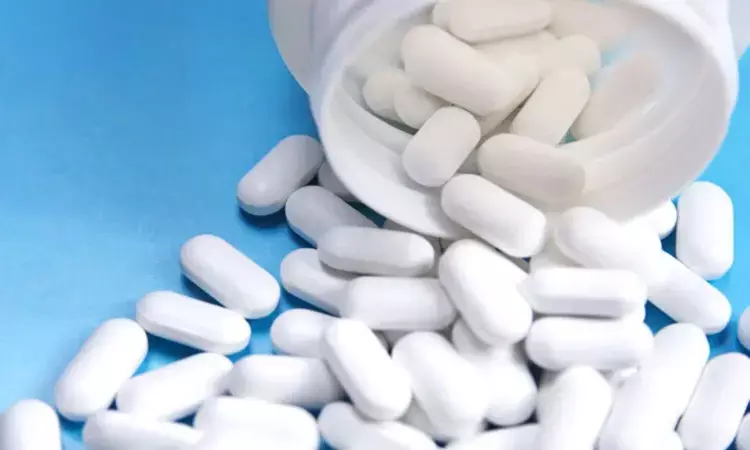- Home
- Medical news & Guidelines
- Anesthesiology
- Cardiology and CTVS
- Critical Care
- Dentistry
- Dermatology
- Diabetes and Endocrinology
- ENT
- Gastroenterology
- Medicine
- Nephrology
- Neurology
- Obstretics-Gynaecology
- Oncology
- Ophthalmology
- Orthopaedics
- Pediatrics-Neonatology
- Psychiatry
- Pulmonology
- Radiology
- Surgery
- Urology
- Laboratory Medicine
- Diet
- Nursing
- Paramedical
- Physiotherapy
- Health news
- Fact Check
- Bone Health Fact Check
- Brain Health Fact Check
- Cancer Related Fact Check
- Child Care Fact Check
- Dental and oral health fact check
- Diabetes and metabolic health fact check
- Diet and Nutrition Fact Check
- Eye and ENT Care Fact Check
- Fitness fact check
- Gut health fact check
- Heart health fact check
- Kidney health fact check
- Medical education fact check
- Men's health fact check
- Respiratory fact check
- Skin and hair care fact check
- Vaccine and Immunization fact check
- Women's health fact check
- AYUSH
- State News
- Andaman and Nicobar Islands
- Andhra Pradesh
- Arunachal Pradesh
- Assam
- Bihar
- Chandigarh
- Chattisgarh
- Dadra and Nagar Haveli
- Daman and Diu
- Delhi
- Goa
- Gujarat
- Haryana
- Himachal Pradesh
- Jammu & Kashmir
- Jharkhand
- Karnataka
- Kerala
- Ladakh
- Lakshadweep
- Madhya Pradesh
- Maharashtra
- Manipur
- Meghalaya
- Mizoram
- Nagaland
- Odisha
- Puducherry
- Punjab
- Rajasthan
- Sikkim
- Tamil Nadu
- Telangana
- Tripura
- Uttar Pradesh
- Uttrakhand
- West Bengal
- Medical Education
- Industry
Shorter 12-Hour Acetylcysteine Regimen Safe and Effective for Moderate Paracetamol Overdose: SARPO Trial Finds

Australia: A new randomized controlled trial published in the Journal of Hepatology has shown that a shorter, 12-hour acetylcysteine regimen is just as effective and safe as the conventional 20-hour treatment for managing paracetamol overdose of up to 30 grams. The study, known as the SARPO trial, was led by Professor Geoffrey Isbister and his team from the Clinical Toxicology Research Group at the University of Newcastle, Australia.
Paracetamol overdose is one of the most common causes of drug poisoning globally. Timely administration of acetylcysteine remains the cornerstone of treatment to prevent liver damage. Traditionally, a 20-hour intravenous acetylcysteine regimen—300 mg/kg split across 4 hours and 16 hours—is the standard protocol. However, prolonged treatment can be uncomfortable and resource-intensive for both patients and healthcare providers.
To assess whether a shorter treatment duration could offer similar clinical outcomes, researchers conducted a non-inferiority randomized trial across three hospitals. A total of 204 patients with acute paracetamol overdoses of 30 grams or less, who presented within 8 hours of ingestion, were randomly assigned to receive either the conventional 20-hour treatment or a condensed 12-hour regimen (200 mg/kg over 4 hours followed by 50 mg/kg over 8 hours).
The study's primary focus was to measure the change in alanine aminotransferase (ALT) levels 24 hours post-ingestion compared to baseline, a key marker of liver injury.
The study led to the following findings:
- The shorter acetylcysteine regimen showed a median ALT change of -2 U/L compared to -1 U/L in the standard regimen group.
- The difference in ALT change was within the acceptable non-inferiority margin.
- No patients in the shorter regimen group had significant liver enzyme elevations (ALT ≥2x baseline and >150 U/L).
- No patient in either group recorded ALT levels exceeding 1,000 U/L.
- Systemic hypersensitivity reactions occurred in 8% of patients on the shorter regimen and 10% on the standard regimen.
- 73% of the short regimen group and 65% of the standard group reported gastrointestinal side effects.
- The shorter regimen nearly halved the overall treatment duration and length of hospital stay.
The researchers emphasize that while the 12-hour protocol is promising for uncomplicated, single-time ingestions of paracetamol ≤30 g, it should not be generalized to high-risk cases such as staggered ingestions, overdoses with uncertain timing, or modified-release formulations.
Despite some limitations—including strict inclusion criteria and a slight imbalance in randomization across subgroups—the study supports the feasibility of a simplified treatment approach. According to the authors, this protocol could potentially be applied to about one-third of acute paracetamol overdose cases, reducing the burden on emergency services and improving patient comfort without compromising safety.
Reference:
Isbister, G., Chiew, A., Buckley, N., Harris, K., Berling, I., Downes, M., Page, C., & Isoardi, K. (2025). A non-inferiority randomised controlled trial of a shorter acetylcysteine regimen for paracetamol overdose – the SARPO trial. Journal of Hepatology. https://doi.org/10.1016/j.jhep.2025.05.008
Dr Kamal Kant Kohli-MBBS, DTCD- a chest specialist with more than 30 years of practice and a flair for writing clinical articles, Dr Kamal Kant Kohli joined Medical Dialogues as a Chief Editor of Medical News. Besides writing articles, as an editor, he proofreads and verifies all the medical content published on Medical Dialogues including those coming from journals, studies,medical conferences,guidelines etc. Email: drkohli@medicaldialogues.in. Contact no. 011-43720751


